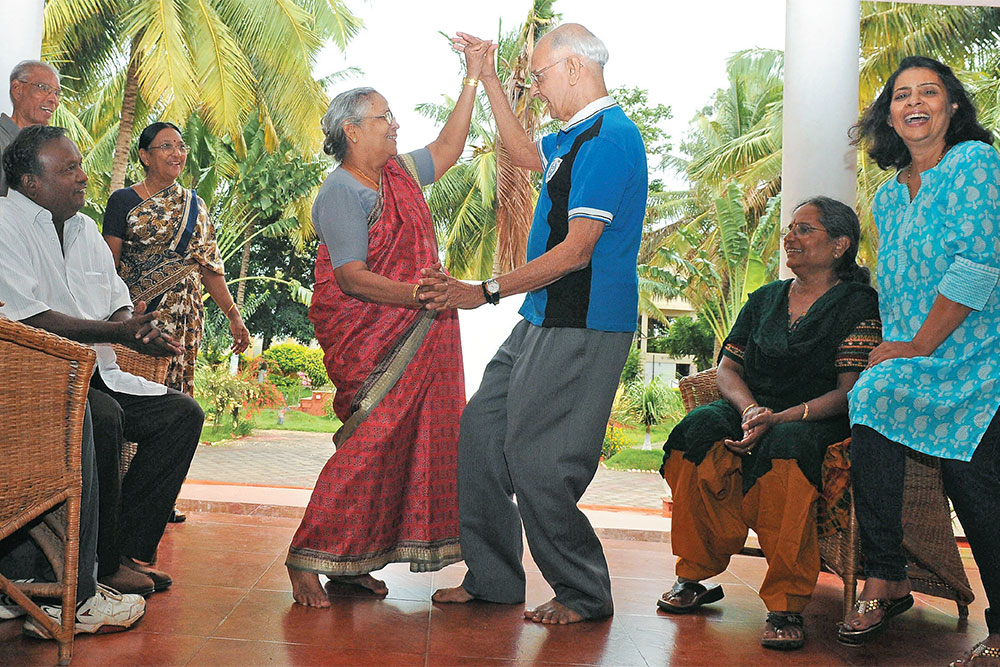Property developers who target young, nuclear families don’t know what they are missing. Senior living is a $25-billion industry globally and the US alone has over 2,000 housing projects catering to this community. Now, there’s a boom in this sector in India as well, albeit on a much smaller scale — according to some reports, there are already over 30 projects in the country exclusively for older people, with an equal number in the pipeline. Most of these projects are located outside smaller towns, in locales carefully selected for their salubrious climate and pollution-free surroundings away from the hustle and bustle of big cities. But there’s a flip side to so much peace and quiet — getting out can be a problem, finding help isn’t easy and seclusion can all too easily segue into loneliness and separation.
Some developers are now working to keep the golden oldies in the mainstream. Coimbatore-based Serene Retirement Communities has completed four senior living projects in Coimbatore and Puducherry. Now, it is focusing on the integrated senior housing model, where retirement homes are part of a larger township. “Awareness and interest in such homes is really going up,” says PB Anand, CEO, Serene Retirement Communities. In 2012, the company launched its first integrated senior living project, Serene Adinath, with Chennai-based developer Adinath Foundation. While the property will be operational by July 2014, all 240 retirement homes of the total 600 have been sold.
The second project in Chennai is what Anand calls the only “hybrid model” in his portfolio, where seniors live among other residents, with some apartments earmarked for them on each floor, rather than in separate buildings in the same complex. Serene Pushkar has 130 units within the 500-house complex, and Anand says 60% have already been sold.
For its Bengaluru project, Serene has tied up with a local builder, Ozone, to make 314 retirement homes in the first phase as part of the builder’s upcoming 150-acre township at Hebbal. All flats have been sold, and Serene is in talks to build another 200 in the township. Similarly, it has signed up to build 250 apartments within MAK Projects’s new Banyan Tree Retreat in Hyderabad. The project, launched in December 2013, has seen 30% of the apartments sold already. “We created awareness that this is a lifestyle option, not about living in retirement homes,” says Anand.
Others are launching similar, integrated living projects. The just-launched Rs 350-crore Melia First Citizen at Gurgaon is a case in point. Of the 950 apartments on offer in 14 towers, 156 flats in two towers will be dedicated to senior living, complete with facilities such as an ambulance service, emergency call buttons, rest benches and wheelchair-accessible toilets. Access will be open to the club and other facilities in the main township. There is even a tie-up with private schools nearby for teaching opportunities for these older residents. “This is an attempt to break away from senior citizen residential projects that create a sense of isolation among their residents from mainstream living,” says Arun Gupta, CEO, Age Ventures India (AVI). “The world over, isolation is being criticised.”
A private trust set up in 2008, AVI partners with real estate developers on creating such spaces within their upcoming communities. It works on a knowledge-sharing agreement with Helpage India and the Methodist Housing Association (MHA) of the UK, which is involved in care giving and housing support for the elderly. Designs for the projects are approved by the MHA in conformance with UK standards of safety and user-friendliness for senior citizens.
The Gurgaon project is with Group Silverglades, a boutique real estate developer in Delhi NCR. AVI is also partnering with ARG Group in Jaipur and Brigade Group in Bengaluru on similar communities within their township projects. “India’s challenge is social, not lifestyle,” says Gupta.
Apart from loneliness, the elderly face other issues such as limited availability of domestic help, who come at exorbitant costs, and the fact that urban infrastructure doesn’t support senior citizens’ transportation needs. Moreover, disabled-friendly systems are hardly developed in Indian society, even in the major cities. “At 60+ years of age, the supply of resources begins to dwindle like a hockey stick curve or it’s mismatched to their needs,” he adds.
With prices starting at Rs 60-85 lakh for a 1BHK at current prices, not surprisingly, these separate-yet-together projects aren’t for everyone. The concept has received more interest from NRIs whose children are settled overseas and who wish to return to India to live out their final years, says Anubhav Jain, director, Group Silverglades. It’s aimed also at wealthy individuals currently living alone in independent houses. Clearly, there’s a golden opportunity in catering to the silver-haired.
—With inputs from Krishna Gopalan











